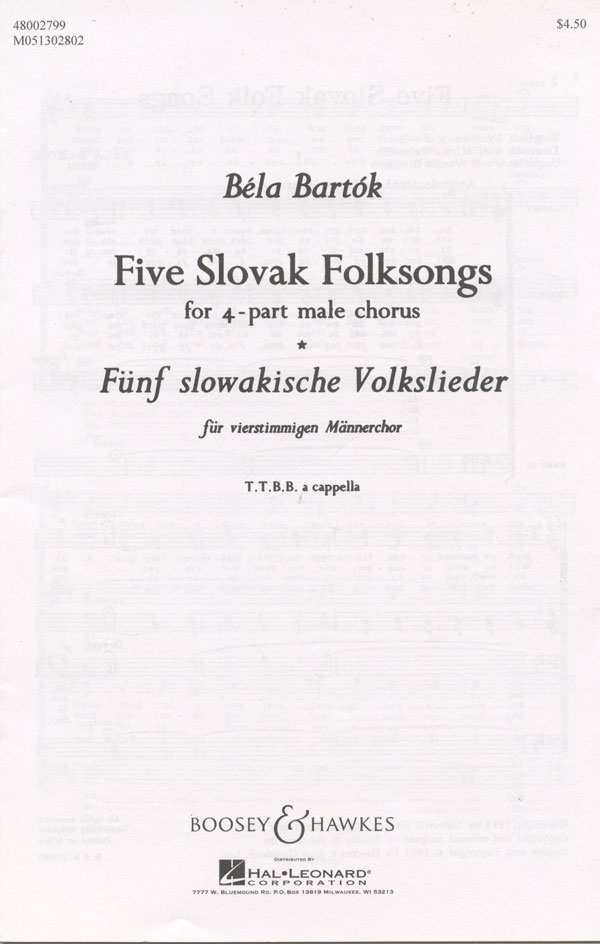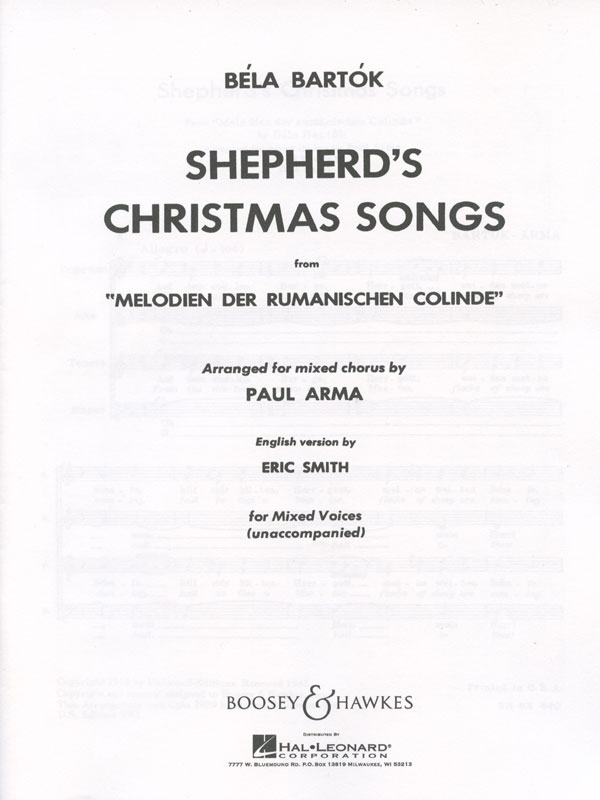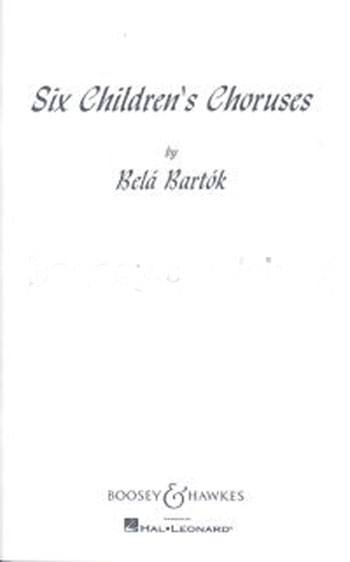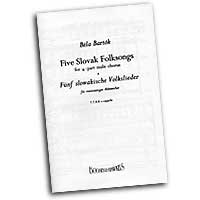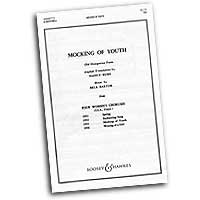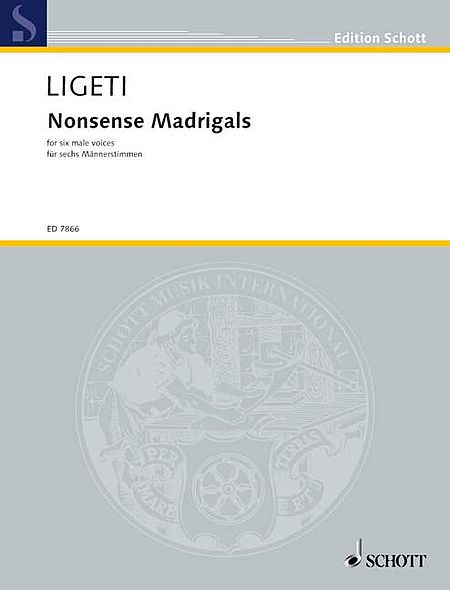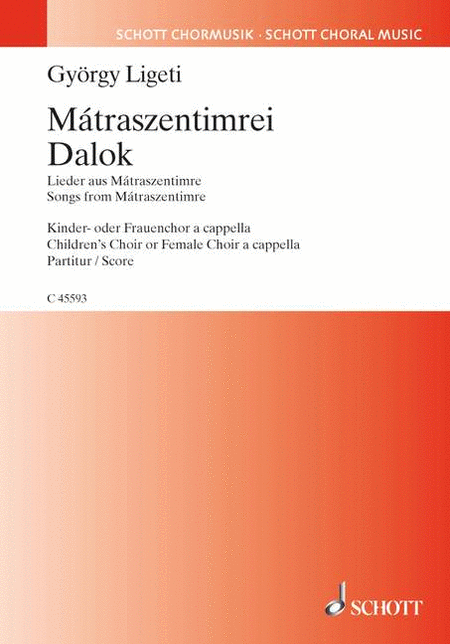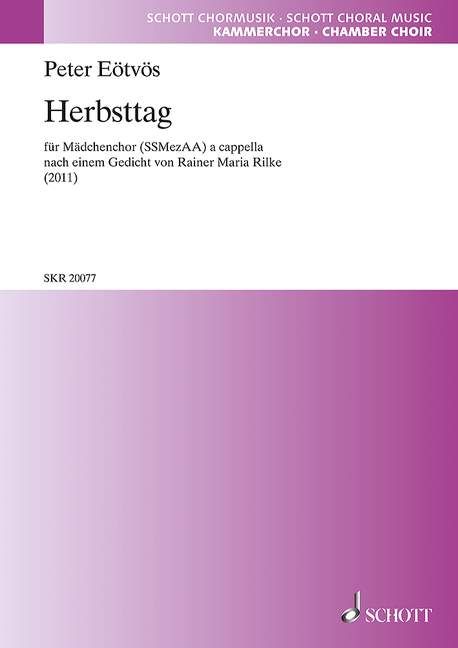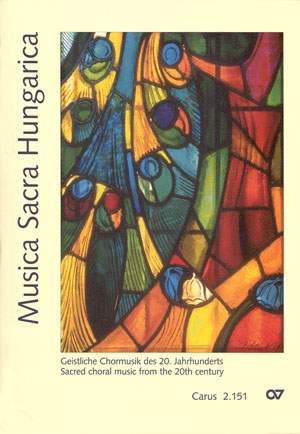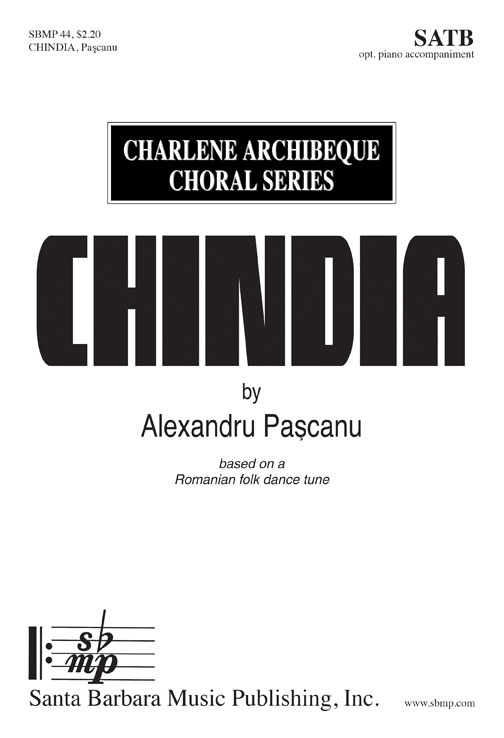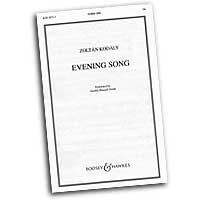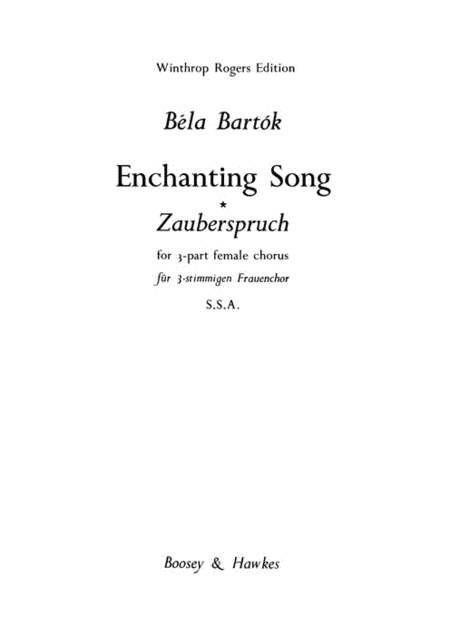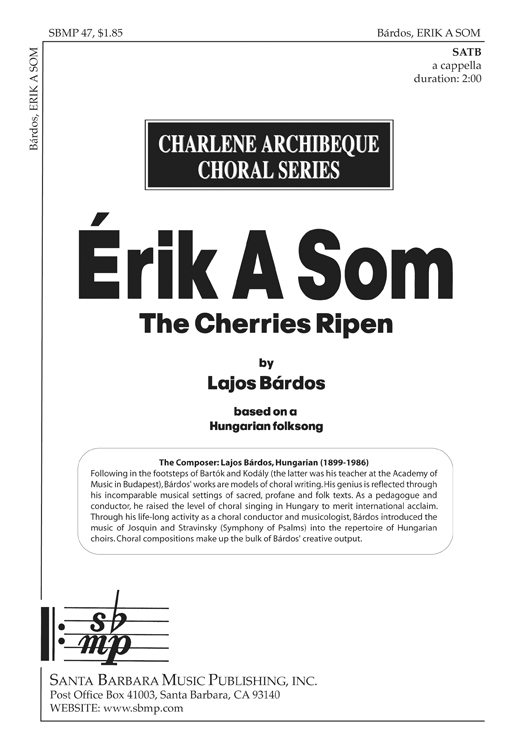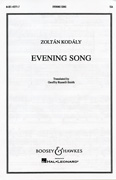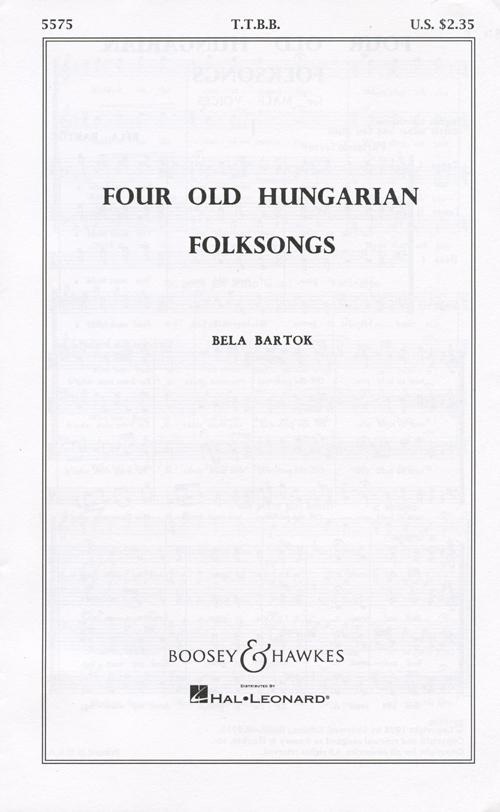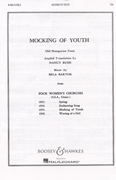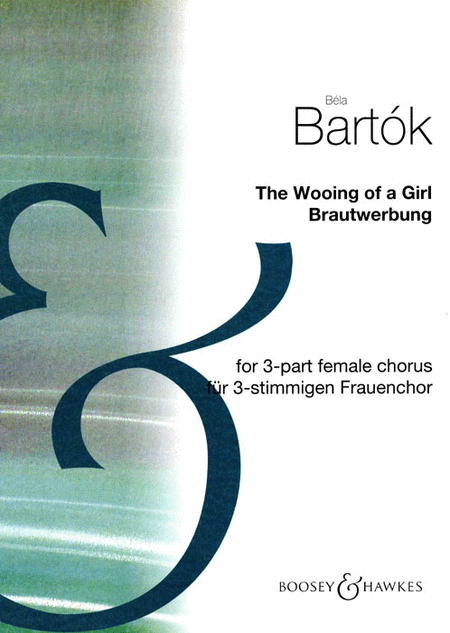In Celebration of the Human Voice - The Essential Musical Instrument
Home | Doo Wop | Barbershop | World | Contemporary | Christian | Vocal Jazz | Choral | Christmas | Instructional | Arrangements
Classical | Opera | Musicals | Personality | Young Singers | Disney | Videos | Songs | The Artists

Choral Arrangements from Hungary

| Traditional and modern Hungarian choral and folksongs arranged for harmony voices. |
![]() Arrangements from Eastern Europe - Armenia | Bosnia | Bulgaria | Czech | Georgia | Hungary | Poland | Romania | Serbia | Slovakia | Slovenia | Ukraine
Arrangements from Eastern Europe - Armenia | Bosnia | Bulgaria | Czech | Georgia | Hungary | Poland | Romania | Serbia | Slovakia | Slovenia | Ukraine
Songbooks, Arrangements and/or Media
Displaying 1-21 of 21 items.
Bela Bartok : Five Slovak Folksongs "Many people think it is a comparatively easy task to write a composition on found folk tunes... This way of thinking is completely erroneous. To handle folk tunes is one of the most difficult tasks; equally difficult, if not more so, than to write a major original composition. If we keep in mind that borrowing a tune means being bound by its individual peculiarity, we shall understand one part of the difficulty. Another is created by the special character of folk tune. We must penetrate it, feel it, and bring out its sharp contours by the appropriate setting... It must be a work of inspiration just as much as any other composition." - Bela Bartok. Includes English text. Bela Bartok : Shepherd's Christmas Songs Arranged for unaccompanied mixed voices by Paul Arma with English text by Eric Smith these pieces are from "Melodien der Rumanischen Colinda". Bela Bartok : Six Songs for Children's Choruses The original version of these choruses was an a cappella version; later an orchestral accompaniment was added. The piano reduction of the latter has merely been added to the present edition for rehearsal purposes when preparing the choir for a performance with orchestra. it is the composer's intention that performances should talk place either a cappella or with orchestra, but not with piano. Songlist: Hussar, Only Tell Me, Loafer, Bread Baking, Don't Leave Me!, Teasing Song Bela Bartok : Hungarian & Slovak Folksongs Text in English, German and Hungarian. Songlist: Four Old Hungarian Folksongs, Five Slovak Folksongs Bela Bartok : Three Hungarian Folk Songs "Many people think it is a comparatively easy task to write a composition on found folk tunes... This way of thinking is completely erroneous. To handle folk tunes is one of the most difficult tasks; equally difficult, if not more so, than to write a major original composition. If we keep in mind that borrowing a tune means being bound by its individual peculiarity, we shall understand one part of the difficulty. Another is created by the special character of folk tune. We must penetrate it, feel it, and bring out its sharp contours by the appropriate setting... It must be a work of inspiration just as much as any other composition." - Bela Bartok Songlist: Mocking of Youth - from Four Women's Choruses, Spring, Enchanting Song Gyorgy Ligeti : Hortobagy - Three Hungarian Folksongs For unaccompanied mixed voice choir. English translation inlcuded. Gyorgy Ligeti : Nonsense Madrigals  First premiered by the King's Singers in Queen Elizabeth Hall these compositions are a delight and will be a welcome addition to your repertoire. English text by William Rands and Lewis Carroll. Difficult. Songlist: Two Dreams and Little Bat, Cuckoo in the Pear-Tree, The Alphabet, Flying Robert, The Lobster Quadrille, A Long, Sad Tale Gyorgy Ligeti : Songs from Matraszentimr Dalok A collection of Hungarian folk songs for unaccompanied upper voice choir. Songlist: Harom hordo, Igaz szerelem, Gomb, gomb, Erdobe, erdobe Lajos Bardos : Musica Sacra Vol 3  This volume contains canons and choral pieces for female, children's or upper voices. Songlist: Adoremus, Aki magat felmagasztalja, Aron vetettetek, Ave maris stella, Boldogasszony anyank, Buntetesunk hordozta, Ekes nap, Fel, fel, dalra fel, Halljatok meg az Ur hangjat, Hallod-e Jezus hivasat?, Istene az aldas, Krisztusban dicseked, Legy hiv mindhalalig, Mas nev nincs, Mennyorszag ajtaja, Nagybojti kanon (Konyorulj rajtam), O, en edes Jezusom, Szalljon a dal, Szent karacsony ejjel (O, gyonyoruszep, titokzatos ej!, Szolj, Uram, szolj, Teljes szivemmel, Zsoltar-kanon, Mennyorszagnak kiralyneja, O, edes Jezus Lajos Bardos : Songs For Various Occaisions  Songlist: Alleluja, Audi, filia, Dixit Dominus Domino meo, Jesu dulcis memoria, Libera me, Mane nobiscum, Rex clementissime Lajos Bardos : Music for Christmas and Easter  This volume contains works for mixed voices pertaining to Christmas and the Easter season. Songlist: Adjunk halat immar (Graces soient rendues), Adorna thalamum (Ekitsd fel templomod), Karacsonyi bolcsodal, Karacsonyi kirie, Mennybol az angyal, Napkeleti kiralyok, Nosza, lelkem!, O gloriosa virginum, O Jesule, Sancta parens, Szep kelet, szep nap! (ejev), A keresztfahoz megyek, Alleluja! orvendezzunk, Ascendit Christus, Bunbanoknak menedeke, Bunos lelek, En nemzetem (Popule meus), Fiam, Jezus, Golgotadon latunk, Ingrediente Domino (Viragvasarnap), Keresztenyek, sirjatok, Kiralyi zaszlo jar elol (Vexilla regis prodeunt), Krisztus, viragunk (A), Krisztus, viragunk (B), O Jezus, Jezus (O languens Jesu), O languens Jesu, Orvendetes napunk tamadt, Popule meus, Surrexit Christus, Szent kereszted unnepere, and more Peter Eotvos : Herbsttag This six-minute madrigal setting was commissioned by the renowned Hanover Girls' Choir and composed on the basis of one of Rainer Maria Rilke's profound poems. It begins as a thanksgiving prayer: for the summer, for the autumn fruits. But the first winds bring along the fear of the cold and loneliness of winter: 'Whoever is alone now will remain so for a long time, will stay up, read, write long letters". Eotvos lets the poem unfold twice, each time in a different way, thus intensifying the reflection. The tonality is treated freely, and the choral setting extends the underlying five-part texture, in which the choir's soloists create striking echoes, up to eight-part passages. Various Arrangers : Musica Sacra Hungarica The choir book Musica Sacra Hungarica provides a survey of the broad spectrum of sacred vocal music produced in Hungary during the 20th century. Following on from the romantic heritage an individual Hungarian vocal style was developed, which became known internationally through the sacred and secular vocal works of Bela Bartok, Zoltan Kodaly and Lajos Bardos. Songlist: Abendlied, Aeterne Rex, Adoramus te, Ad te Domine levavi, Ave Maria, Ave Maria, Ave maris stella, Ave verum corpus, Cantate Domino, Crucifigatur, Da das Pascha Nahte, De profundis, Deus tu convertens, Dextera Domini, Dicunt omnes, Dunkelheit umfangt uns, Eli, Eli, Et circa horam nonam, Exsurge, Hodie Christus natus est, Jesu Dulcis memoira, Jesus und die Kramer, Jubilate Deo, Kyrie, Kyrie in D, Laudate Dominum, Libera me, Magnificat, O crux ave, O gloriosa virginum, and more Various Arrangers : Eastern European Folk Songs Lajos Bardos' Hungarian composition, 'Erik A Som,' has easy melodies and harmonies, the challenge comes with the text, as the Hungarian language is a bit more difficult, than others, to learn. Hungarian words are always accented on the first syllable. There are no diphthongs; if two vowels appear together, each is distinctly pronounced. A helpful guide to learn how to speak the text is included. 'Chindia,' is perhaps Pascanu's most famous composition. It is based on an instrumental Romanian folk dance by the same name. 'Chindian' besides being the name of a folk dance, refers both to the time of day just before the sun sets and to the place in the sky where the sun goes down. The dance is perfomed by both men and women in a closed circle, the dancer's arms on each other's shoulders. A vigorous dance, it uses small steps, and may include amusing, somewhat athletic stunts. This wordless piece is very exciting to sing! 'Sednalo e Djore dos' is based on a very famous Bulgarian folk tune that has circulated in the oral tradition of Bulgarian folk singers for many years. It is characterized by its short and repetitive melodic line flavored with a lot of humorous energy. In this arrangement, the arranger has paraphrased the melody slightly thus allowing it to become a good foundation for harmonic variations. Ivan Hrusovsky's 'Rytmus' has excellent, fun rhythms along with great (but relatively simple) harmonies. The latin text moves niceley with the melodies. Songlist: Rytmus, Sednalo e Djore dos, Chindia, Erik A Som (The Cherries Ripen) Zoltan Kodaly : Let Us Sing Correctly - 101 Exercises in Intonation Based on sol-fa notation combined with unaccompanied part singing from the earliest stages in a child's school music, the Kodaly Method develops musical literacy, secure intonation and rhythmic confidence - essential fundamentals of sound music education. The Kodaly Choral Method is a comprehensive series of progressive songs and sigh-singing exercises designed to promote a thorough understanding of interval and tonality. By incorporative a wide range of Hungarian folk music and poetry, Kodaly has produced a stimulating addition to the repertoire of school and amateur choirs. This collection contains 101 exercises in intonation, and serves as an introduction to the five volumes of two-part exercises Songlist: Let Us Sing Correctly, 101 Exercises in Intonation Zoltan Kodaly : 55 Two-Part Exercises The Kodaly Choral Concept is revised in an English Edition by Geoffry Russell-Smith. Zoltan Kodaly : Choral Works for Children's and Female Choirs A collection of 75 pieces by noted composer and educator. Suitable for upper voices. Some are quite challenging while other pieces are simple and delightful. Songlist: Hegyi ejszakak I-V, Jankovich Ferenc: Jelige, Nagyszalontai koszonto (konnyu letet), Nagyszalontai koszonto, Angyalkert - Kecskejatek, Angyalkert - Tyukozas, Angyalkert - Gyertyajatek, Angyalkert - Bent a barany, Angyalkert - Vasarosdi, Hat trefas kanon - Lencse, borso, kasa, Hat trefas kanon - Madarak voltunk, Hat trefas kanon - A leanyka szotalan, Hat trefas kanon - Tyukkergeto, Hat trefas kanon - Furdo utan, Hat trefas kanon - Mikor mentem misere, Szolmizalo kanon, A juhasz, Het konnyu gyeremekkar - Eva, szivem Eva, Het konnyu gyeremekkar - Falu vegen, Het konnyu gyeremekkar - Heja, Het konnyu gyeremekkar - Versenges, Het konnyu gyeremekkar - Ciroka, Het konnyu gyeremekkar - Jo gazd'asszony, Het konnyu gyeremekkar - Zolderdoben, Weores Sandor: Bekedal, Vargha Karoly dr: Az eneklo ifjusaghoz, Nyulacska, Katalinka, A csiko, Cu fol, lovam, and more Zoltan Kodaly : Choral Works for Mixed Voices A collection from the great Hungarian composer for mixed voices. Forty Five arrangements ranging from easy to difficult. Songlist: Jankovich Ferenc: Jelige (kis vegyeskar), Jankovich Ferenc: Jelige (nagy vegyeskar), Koszonto, Arany Janos, Gyulai Pal: Janos koszonto, Gomori dal, Esti dal, Vargha Karoly dr: Az eneklo ifjusaghoz, Horatius, Vargha Karoly dr: Horatii Carmen, Vorosmarty Mihaly: Magyarorszag cimere, Pange lingua (l), Vargha Karoly dr: Cohors Generosa, Szedo Denes: Adventi enek, Enek Szent Istvan kiralyhoz (fiu-vegyeskar), Enek Szent Istvan kiralyhoz (kisebb vegyeskarra), Enek Szent Istvan kiralyhoz (nagy vegyeskarra), Bodrogh Pal: Sirato enek, Szekely keserves, Petofi Sandor: A Szekelyekhez, Ady Endre: Akik mindig elkesnek, Petofi Sandor: A magyar nemzet, Balassi Balint: Szep konyorges, Az 50. genfi zsoltar, A 121. genfi zsoltar, Szedo Denes: Elso aldozas, Weores Sandor: Norveg lanyok, Weores Saandor: Oregek, Ady Endre: Folszallott a pava, Kisfaludy Karoly: Mohacs, Turot eszik a cigany, Molnar Anna, and more Zoltan Kodaly : Mountain Nights - Songs Without Words for Women's Voices A fascinating and fun set of wordless songs by the Hungarian master. Songlist: Mountain Nights I, Mountain Nights II, Mountain Nights III, Mountain Nights IV, Mountain Nights V Zoltan Kodaly : Hungarian Folk Songs for Children's Chorus The Hungarian composer, Zoltan Kodaly, an ethnomusicologist and educationalist, pioneered the reintegration of folk material into 20th century choral music. All four songs in this packages are arrangements based on Hungarian folk songs for children, with english translations by Georffy Russell-Smith. Songlist: Hippity, Hoppity, Ladybird, 'Mid K, Evening Song Zoltan Kodaly : Ferfikarok - Choral Works For Male Voices  A collection of unaccompanied works from the famed Hungarian composer. Songlist: A Magy Arokhoz, A Szabadsag Himnusza - La Marseillaise, Jelige, Enek Szent Istv An Kiralyhoz, A Csiko, Esti DAl, A Nandori Toronyor, Emleksorok Fay Andrasnak, A Franciaoszagi Valtozasokra, Justum Et Tenacem - Renduletlenul, Jelenti Magat Jezus, Rabhazanak Fia, Katondal, Hej Bungozsdi Bandi, Folszallott A Pava, Huszt, Kit Lene Elvenni, Karadi Notak, Semmit Ne Bankodjal, Isten CSodaja, Elet Vagy Halal, Nemzeti Dal, Bordal, Mulato Gajd |
Displaying 1-10 of 10 items.
This lively original is set in the style of a Hungarian csardas, with sparkling dance-like rhythms and a whirling, twirling text that evokes the gypsy-style violin that it describes. Perform it as a concert piece, or use the energetic ShowTrax Cassette to display a variety of European folk dances. Available: SAB, 2-Part, ShowTrax Cassette. Performance Time: Approx. 2:30.
Arranger: George L.O. Strid | Country: Hungary
A delightful Hungarian folksong, arranged in two parts except for brief refrains. A pronunciation guide to the Hungarian text is underlayed and an English text is provided.
Country: Hungary
Hungarian composer Gyorgy Orban arranged this Shakespeare text for a cappella mixed voices. Works well with high school or adult choirs. Difficulty Level: Medium Advanced Middle School, High School or Medium Adult. Duration - 00:01:00.
Composer: Gyorgy Orban | Country: Hungary
Select a Category |
Want to Sing? - Find a Chorus Near You
List of Choruses by State | List of Choruses by City

